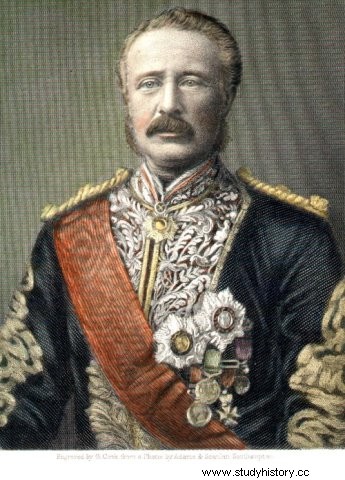Charles George Gordon, English general, nicknamed Gordon Pasha, was born on January 28, 1833 and died in Khartoum, Sudan on January 26, 1885.
A pupil of the Woolwich Military Academy, he served in the Crimea, then in the China campaign of 1860. The Taï-pings or rebels with long hair, taking advantage of the weakening of the Chinese empire after the victory of the allies, s rose up to overthrow the Manchurian dynasty and became masters of much of China. With the consent of his government, Charles Gordon entered the service of China. At the head of a handful of Europeans, he reorganized the Chinese army, freed threatened Shanghai (Shanghai), recaptured Souchow and Wankin from the insurgents. Gordon's army, "the ever victorious army", rescued the seemingly lost Manchu dynasty and quickly crushed the rebels. In 1863, Gordon, despite brilliant offers from the Chinese, returned to the service of England with the rank of lieutenant-colonel.
In 1874, he entered the service of Egypt, was appointed governor of equatorial Africa and pushed the Egyptian borders to Gondokoro. In 1879, he resigned following difficulties with the new khedive Tewfik.
After having served in India where he became major general, he returned in February 1884 to Egypt to save Khartoum besieged by the troops of the Mahdi (Nubia and Eastern Sudan).
Charles Gordon was of a religious and mystical character; he exalted himself for this mission. He believed that he could repeat what he had done in China and save the cause of England, that is to say, in his eyes, of civilization. Very confident in himself and in the influence that his energy gave him over the populations he had to confront, he entered, to the astonishment of Europe, alone in Khartoum. He could only prolong the resistance of the city. The following year (1885), the dervishes took it and Gordon was killed.

